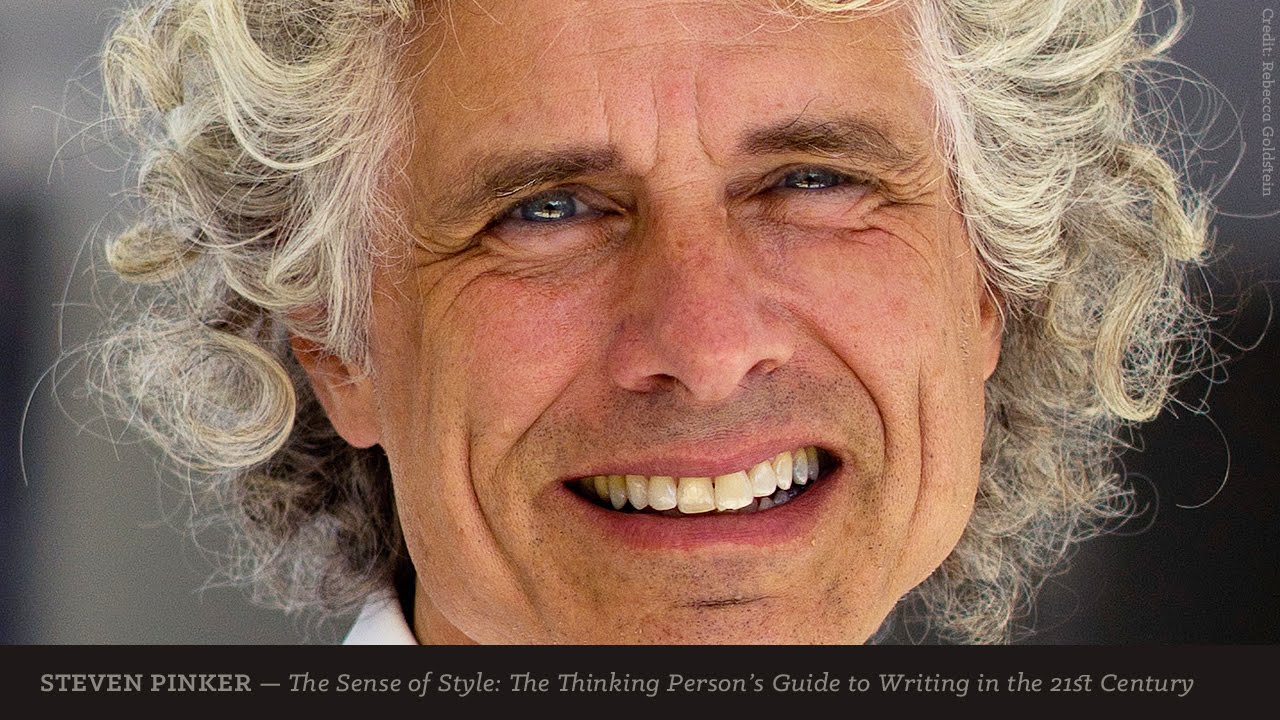Skeptic
WHY IS SO MUCH WRITING SO BAD, and how can we make it better? Is the English language being corrupted by texting and social media? Do people write badly on purpose, to obfuscate and impress? Have dictionaries abandoned their responsibility to safeguard correct usage? Do kids today even care about good writing? In his latest book the Harvard linguist, cognitive scientist, bestselling author (The Language Instinct, How the Mind Works, The Blank Slate, and The Better Angels of Our Nature) and chair of the Usage Panel of The American Heritage Dictionary, Dr. Steven Pinker, answers these questions and more. Pinker applies insights from the sciences of language and mind to the challenge of crafting clear, coherent, and stylish prose. Filled with examples of great and gruesome modern prose, The Sense of Style shows how the art of writing can be a form of pleasurable mastery and a fascinating intellectual topic in its own right, that is also informed by science. A book signing will follow the lecture.
http://www.skeptic.com/upcoming-lectures/sense-of-style-writing-in-21st-century/
Source




Super interesting talk from a brilliant man!
Thank you for the upload.
My wife and I were there. We listened to the book the week before. Pinker is a brain. Shermer is out of this world!
Diligent practice of writing well seems to clarify the thinking process. A careful writer must review his content and sentence & paragraph structure to clearly convey his message, often forcing his mind to become more systematic in terms of relevance, logic and flow of ideas.
Notice that Steven Pinker and Michael Shermer both speak clearly, a likely result of their prodigious writing. Also notice that both of these writers are strong advocates of critical thinking! They make an excellent pair to speak on this subject.
It bothers me that "literally" can now be used to describe non literal things.
Enjoyable talk – I take issue with Mr Pinker's claim that violence has been declining over the centuries. Impossible claim to make as medical interventions are now in place to prevent death and drone attaches are more specialized etc. I would suggest that it is not that people have become less violent but rather we have become more specialized with respect to how we attach each other. In less industrialized areas of the world violence extends to starvation via corrupted governments and regimens which were not factored into his equations. But the idea that people are become less violent and more compassionate is a nice thought.
Why so empty?
Jump to 16:35 to go straight to Steven Pinker's talk and skip the bad music and other irrelevances. If only Professor Pinker's ideas about clear communication in prose could be applied to editing videos on youtube.
Great questions in the Q&A.
Over these last handful of years, writings and talks by Professor Steven Pinker have been a part of my monthly explorations of many things. Thank you so much for sharing this talk. Simply inspiring!
Asimov never dictated a single one of his writings. On the contrary, his prolific output was due to the fact that he enjoyed the actual process of typing on his typewriter as well as the intellectual aspect of writing. This is something which he mentioned many times in his own autobiographies as well as is mentioned about him by those who knew him, like James Randi and Fred Pohl.
To get rid of the annoying echo, turn the balance on your speakers all the way to the left side.
I literally heart Steven Pinker.
If you decide to re-upload the video, please replicate the Left channel (speaker's mic) to the Right, instead of using the atmospheric one.
Say what you see, then put it away for long enough to check if it can be seen from what you said. Strong writing always emerges from this agreement between writer and reader, that the writer will direct the reader's eye, indeed all of their senses. It's an act as much of sensory choreoography as it is of mutual trust–artificial, yet intimate–formal and conversational at the same time. Knowing that well enough to emphasize it is the very thing that makes Pinker as good a writer as he is. Does it help to have a Muse? Sometimes, depending on what you're trying to say. Unfortunately, when commenting online it isn't convenient to put a draft away for a week, to see if it makes sense, and doesn't make you cringe at the thought of someone else reading it. Even if you do get around to editing a comment, it may be too late to repair damage done to the reader's trust, and consequently to the writer's expectation of it. That's how instant messaging can corrode style, depending on how much you are not a verbal Mozart, and rely on the process of editing. Another fact of the psychology of authorship is that an argumentative temperament, which leads to a tendentious style, is especially vulnerable to getting the big things wrong in a big way, and losing sight of them altogether in the pursuit of getting endless little details right. They're at far higher risk of aimless digression, or sounding schizophrenic in writing, when they don't in speech. It's what makes most of the attempts at elaboration in "flame wars" writing lapse into incoherence.
1:02:17 for those of you who are as curious and ignorant as I was:
-Meretricious
ˌmerəˈtriSHəs/
adjective
apparently attractive but having in reality no value or integrity.
"meretricious souvenirs for the tourist trade"
"High falootin' gogglygoop"
Audio is only on the left speaker/earphone!
Pinker starts at 16:46 .
Also, use the left speaker only to avoid the awful echo.
I wonder whether the woman at 1:38:01 knows she's a cartoon character. If she were a few decades younger, one might think her a troll.
1:56:02 If memory serves, Rod Serling of The Twilight Zone fame dictated his prose at least some of the time, and like Hitchens, his first draft was his last.
48:23
Pinker actually meant:
"Don't know the intermediate steps that the writer deemed too obvious to mention."
1:02:20
Meretricious: look at ~%90 of advertisements.
I enjoyed this, but he shouldn't say anything against Orwell because he is copying what Orwell said in "Politics and the English Language"; he is merely using modern, very amusing examples to illustrate Orwell's claims. Second, no one, including Orwell, ever said never use passive voice. Instead, passive voice is used when the agent isn't know or isn't important. However, passive voice is, more often than not, problematic because it gets rid of agents and actions, and in order for English to be clear, readers need to know who is doing what to whom at all times. Second, passive voice adds wordiness because it adds some form of the "to be" verb, and all good writers know that active verbs are more interesting to read. Passive voice also add wordiness, which causes clarity problems. And passives often cause a writer to change sentence subjects unnecessarily throughout a paragraph, causing the paragraph to be choppy, instead of unified and coherent. Also, at the end of his essay, Orwell cautions writers to break any of these rules if they are going to write terrible prose following them.
Orwell had a very valid point. His essay claimed that modern language is a mass of abstractions, particularly political writing, and that most political writing is the "defense of the indefensible." Governments obscure meaning so they can obtain support for actions no one would be willing to agree to if clearly conveyed. Orwell also suggested that bad writing allows us to have sloppy thoughts.
Finally, when we are speaking, most of us replace singular nouns with plural pronouns, but clearly Steven Pinker has never read a freshman composition essay where every single singular noun is replaced with the plural pronoun they. I suspect if he ever has the opportunity to do so, he will change his mind about his advice that it's okay to do that.
What the bloody hell is up with this convention and sound? I've watched lots of these videos before but this year I couldn't watch a single one because the sound is absolutely horrible. Half the time you can't understand a word that's being said.
In my humble quest to apply to online comments some of the advice so clearly put forward by professor Pinker, more specifically to try and avoid needless words, I won't even try to explain why I so much enjoyed this video, nor will I begin to point out how in my opinion much of what was said is not only relevant to coding but also sheds light on the ever seemingly daunting task of writing (good) software documentation, and will instead summarise my thoughts by simply saying: OMG.
Lovely talk :).
mild exposure to CO can result in accumulated damage over time. Extreme exposure to CO may rapidly be fatal without producing significant warning symptoms was eventually shortened down to lol ‘using a generator indoors can kill you in minutes’, after people kept dying as they couldn’t understand the message… Good one!
I hate the Q&A .. Allways some deuchebag's commenting never asking the Question. Like they think.. Now is our big momment. Beffore the Q&A they should review the question. What is your question .
Why is the audio so shitty?
I don't know what's worse: an unreceptive audience, or an audience too keen. Cackling, forced laughter is unbearable.
Data is plural, so one should use are instead of is when using data in a sentence.
About the sound… Use a directional mic. Your left channel is directed at the speaker system but your right mic is picking up the echo at the back of the room. Makes for audiosuck.
Pinker is an excellent speaker. Much better than celebrity scientists like Tyson.
What's with the old lady at the start of the question period?
I made a new wordbut, dishappilythe word police found outand now they're after me.
My left ear enjoyed this.
Cool talk. Shame about the audio channels though.
Does any have free audiobook of the same?